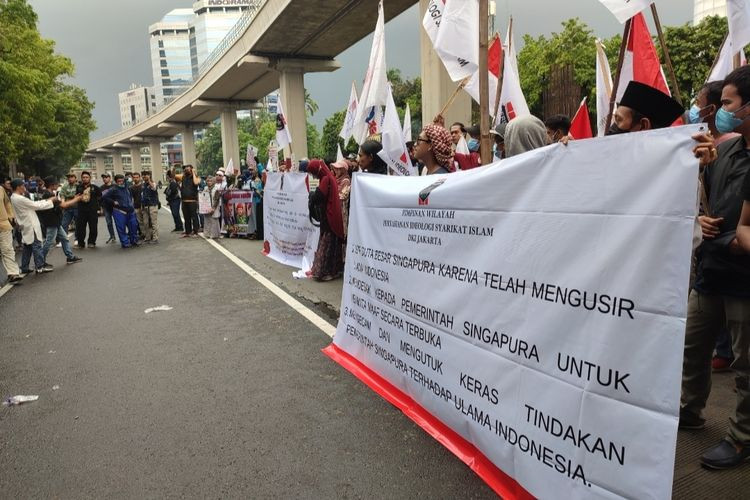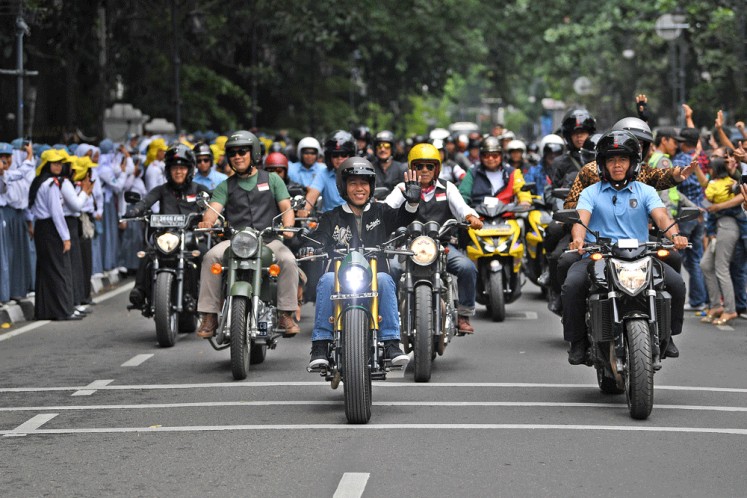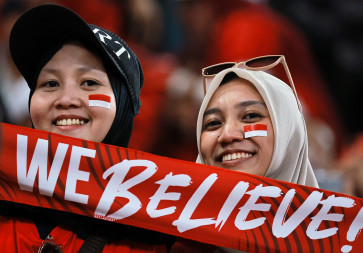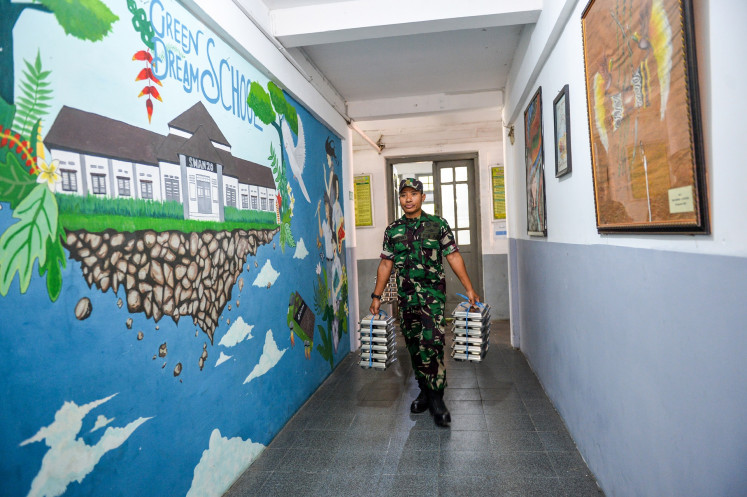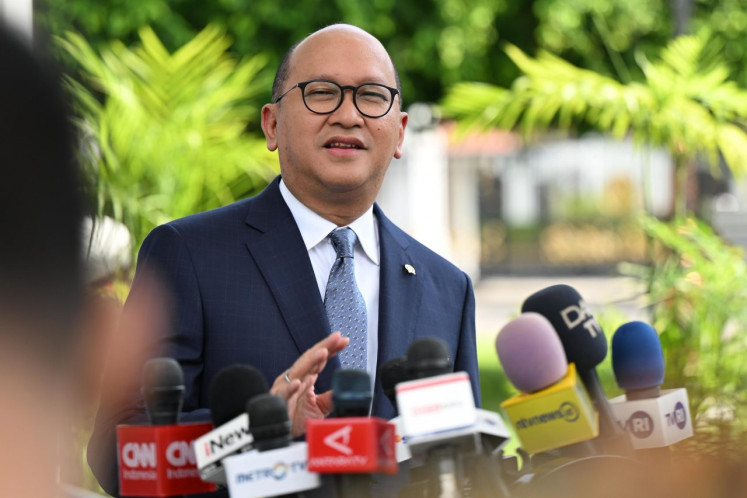Popular Reads
Top Results
Can't find what you're looking for?
View all search resultsPopular Reads
Top Results
Can't find what you're looking for?
View all search resultsSingapore’s Somad debacle stirs questions on intolerance
Muslim cleric Abdul Somad Batubara's recent denial of entry into Singapore has sparked questions of whether Indonesia should consider taking a firm stance against religious intolerance.
Change text size
Gift Premium Articles
to Anyone
T
he recent arrest in Singapore of several alleged followers of Abdul Somad Batubara, a conservative Muslim preacher from Indonesia, has served to underline the different approaches the neighboring countries have when it comes to addressing religious intolerance, analysts say.
Somad, who has a relatively large following, recently made headlines, following his denial of entry into Singapore on May 16. The city-state singled him out as a “religious extremist” unfit to sojourn in the country, a decision that ruffled feathers in Muslim-majority Indonesia.
The incident also affected Singapore, with several people being arrested last week. Singapore’s Law and Home Affairs Minister K Shanmugam said they were being investigated under the Internal Security Act (ISA). He did not disclose the details of their detainment, but insisted they were all followers of Somad.
Indonesia had sent a diplomatic note seeking context for Singapore’s decision to refuse Somad entry, which some experts believe is geared toward quelling potential conflict.
From Singapore’s perspective, Somad was a promoter of segregationist teachings “unacceptable in Singapore’s multi-racial and multi-religious society”. Shanmugam said the recent arrest of Somad followers in Singapore was evidence of the preacher’s hazardous ideology.
“Somad’s teachings have real-world consequences,” he told a group of Singaporean reporters, after sharing an anecdote on how a boy who called for the beheading of Singapore President Halimah Yacob on social media had watched YouTube lectures similar to Somad’s teachings.
He added that some of Somad’s followers had issued public threats since the denial of entry incident, warning that they would attack using bombs and offenses reminiscent of the Sept. 11, 2001 attack in the United States.
“I think one shouldn’t dismiss them completely.”
The Singaporean Embassy in Jakarta did not respond to requests for comments, but Singapore's Coordinating Minister for National Security Teo Chee Hean said on Wednesday that the country took a zero-tolerance approach to hate speech.
Read also: Indonesia acknowledges Singapore's right to bar firebrand preacher
‘Activist’ approach
In the mid-2010s, Singapore faced a rising threat of extremism, primarily from radicalized youths. At least 54 cases of terrorism-related conduct were recorded from 2015 to 2019, according to official data. This alarmed the city-state, whose population is roughly half that of Jakarta.
In 2017, Shanmugam underlined the importance of maintaining a neutral public space and the security of minority positions amid rising intolerance. The nation then started orchestrating steps to nip extremism in the bud.
“The government’s approach is ‘activist’; It is anything but laissez-faire,” he said, as quoted by The Straits Times.
“There are laws, a tough framework of laws, touching on what you can and cannot say about race and religion,” the minister said at the time.
However, the same approach has led Singapore to ban books containing what it considered “offensive and prejudicial content about other religions”. The latest book to be banned was Red Lines: Political Cartoons and the Struggle Against Censorship.
Certain religious groups are also forbidden to assemble, such as the Falun Gong, Jehovah’s Witnesses and the Unification Church. While a 1996 court decision granted individuals the right to profess, practice and propagate their beliefs in Singapore, they are still prohibited from holding public meetings or publishing and importing their literature.
A 2021 report by the United Nations’s human rights office (OHCHR) noted that Singapore’s strict religious and racial laws, particularly those criminalizing behaviors, “promote disharmony or feelings of enmity, hatred or ill-will”.
President Joko “Jokowi” Widodo (middle) rides a motorbike, along with West Java Governor Ridwan Kamil (second left) and members of a biker community during a tour across Bandung, West Java on Sunday to advocate national unity. The event was part of a movement to maintain peace and speak out against intolerance and radicalism. (Antara/Wahyu Putro)Nonprofit US-based think tank Freedom House rated Singapore’s global freedom status as “partly free,” with a score of 47 out of 100, noting that “legal restrictions on topics that involve race and religion constrain dialogue”.
Human Rights Watch (HRW) researcher Andreas Harsono told The Jakarta Post that Singapore’s restriction of some religions is erroneous.
“They banned Falun Gong because of pressure from [China]. But it is not right,” Andreas said on Monday.
‘People like him’
In many ways, the challenges Singapore and Indonesia face are very different. Islam is a minority in the city-state, whereas in the archipelago it is the majority. Singapore’s system of governance was always top-down, whereas Indonesia is a young democracy.
Regardless of Singapore’s perceived success in curbing religious extremism, following in its footsteps and applying the same level of stringency on religious affairs would be a misstep that would “hurt” Indonesia, not heal it, said Husni Mubarak, a researcher at Paramadina University’s Center for Religious Study and Democracy.
“When it comes to terrorism, I think Indonesia, like Singapore, is also an ‘activist’. It has been firm in dealing with terrorist actors and sympathizers. But when we talk about intervening in popular religious leaders promoting intolerant ideas, then things get dilemmatic,” he told the Post on May 20.
Husni noted that the trend of religious intolerance in Indonesia had steadily risen, which made it difficult for the government to make any firm stance without implicating a large number of people. As a result, authorities chose to turn a blind eye to acts or speeches that fuel intolerance, creating a loop that allows intolerance to grow unchecked.
“I think the Indonesian public [...] are becoming more conservative. If the government wanted to arrest Abdul Somad, then they would have to arrest many more. There are a lot of people like him here,” the researcher said.
Somad is not the first populist Islamic figure to have found wide appeal in Indonesia. Before him there was Rizieq Shihab, but also politicians like Fahri Hamzah and Amien Rais. Each played a somewhat similar role in mobilizing a large Muslim following, Husni noted.
“These groups formed from rising extremism, in which social media plays a role,” he said. “Politicians are always cozying up to them every election, falsely assuming it will score them a win. This only justifies their message.”
Read also: Another perspective about Singapore’s rejection of preacher Somad
Not progress
Andreas said the trend of religious intolerance in Indonesia reached its peak during the Susilo Bambang Yudhoyono administration, when the number of blasphemy cases skyrocketed. While some 10 people were prosecuted and convicted during Soeharto’s decades-long rule, the number spiked to 106 individuals during Yudhoyono’s decade, HRW data show.
And while President Joko “Jokowi” Widodo has attempted to deal with the issue by dispersing, for instance, the 212 Alumni Brotherhood (PA 212) protests, Andreas noted that the step was insufficient in healing religious tensions.
“Intolerance is not as bad under President Jokowi, but he has not been able to reverse the damage from the Yudhoyono era. Jokowi has definitely tamed some of these religious groups, but I would not go as far as calling it religious progress,” said the rights activist.

